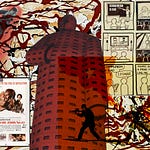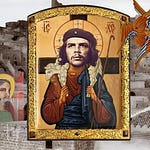Overview: This episode explored the concept of "Propaganda of the Deed" and its historical context, discussing various radical groups and their impact on political movements. Shaenah and Max also examined effectiveness and consequences of political violence, drawing parallels between past events and recent incidents, while emphasizing the importance of mass movements over individual acts.
Main points:
The Historical Context of Propaganda of the Deed
The concept of "Propaganda of the Deed," focusing on its historical association with political violence and its effectiveness as a strategy for social change. They referenced recent events, aiming to provide a historical and critical perspective on the use of political violence as a means to sway public opinion.
Revolutionary Violence: Tactics and Consequences
Max and Shaenah discussed historical examples of propaganda of the deed, including the assassination of Tsar Alexander II and the debates between Marx and Bakunin on revolutionary tactics. They concluded that while revolutionary violence can be justified in certain contexts, it must be organized and tied to broader strategies for meaningful change.
Early 20th Century Bombings and the Palmer Raids
Max discussed the history of bombings and assassinations in the early 20th century, including the 1920 Wall Street bombing and the Palmer Raids, which led to the FBI consolidating its power under J. Edgar Hoover. Also historical parallels were drawn with recent events, including the killing of Israeli embassy staff, and the potential for increased surveillance and crackdowns on pro-Palestinian movements in the U.S.
Weather Underground and the New Left
The Weather Underground, a radical left-wing group from the 1960s and 70s. Also discussed was how the Weather Underground's amateurish and violent tactics were denounced by Fred Hampton of the Black Panthers.
Left-Wing Activism in the 1960s and 1970s
Max and Shaenah discussed the history of left-wing activism in the 1960s and 1970s, focusing on groups like the Weathermen, Black Panthers, and the Symbionese Liberation Army. They noted the lenient sentences given to many Weathermen members, contrasting with the harsh treatment of Black Panthers.
Symbionese Liberation Army: Government Influence
Max discussed the history of the Symbionese Liberation Army (SLA), a radical group that emerged in the 1970s. The SLA's seven principles were similar to those of Kwanzaa, an African American holiday created by Ron Karenga, who was also a government informant. Max suggested that the activities of both the SLA and Karenga's organization were influenced by government agencies like the FBI and CIA.
Radical Groups and Media Manipulation
The historical impact of the Symbionese Liberation Army (SLA) and other radical groups on the left, highlighting how they were often created or manipulated by the security state to undermine progressive movements. The conversation also touched on the case of Luigi Mangione, who shot Brian Thompson, CEO of UnitedHealth, as a protest against the US healthcare system, and how mainstream media often downplayed the class anger behind such acts.
Understanding the Evolution of Conspiracy Theories
Shaenah and Max discussed the definition and implications of conspiracy theories, particularly focusing on how the term was originally coined by the CIA to discredit those questioning the Warren Commission's findings about the Kennedy assassination.
Political Violence and Strategic Fear
The historical instances of political violence, particularly in Italy during the Cold War, where Operation Gladio was used to instigate conflict between the far right and left to prevent the Communist party from gaining power. Max warned that a similar strategy of tension could be emerging in the current political climate, potentially demobilizing the working class and strengthening the political establishment.
Navigating Disinformation and Historical Context
To conclude, the importance of understanding historical events to avoid falling prey to conspiracy theories or blind faith in institutions. The need for caution and skepticism when interpreting news, as well as the sophistication of modern propaganda techniques and the challenges of navigating the disinformation war.
Links:
https://www.record-bee.com/2021/12/30/happy-kwanzaa-the-holiday-brought-to-you-by-the-fbi-3/
https://www.marxists.org/archive/trotsky/1911/11/tia09.htm
https://www.marxists.org/archive/trotsky/1911/11/tia09.htm
https://www.marxists.org/history/erol/ncm-7/lrs-wu.htm
https://www.marxists.org/history/erol/ncm-1/war-council.htm
https://redsails.org/the-philosophical-roots-of-the-marx-bakunin-conflict/
https://dailyvoice.com/new-york/whiteplains/luigi-mangione-musical-is-real-and-its-sold-out/
















Share this post